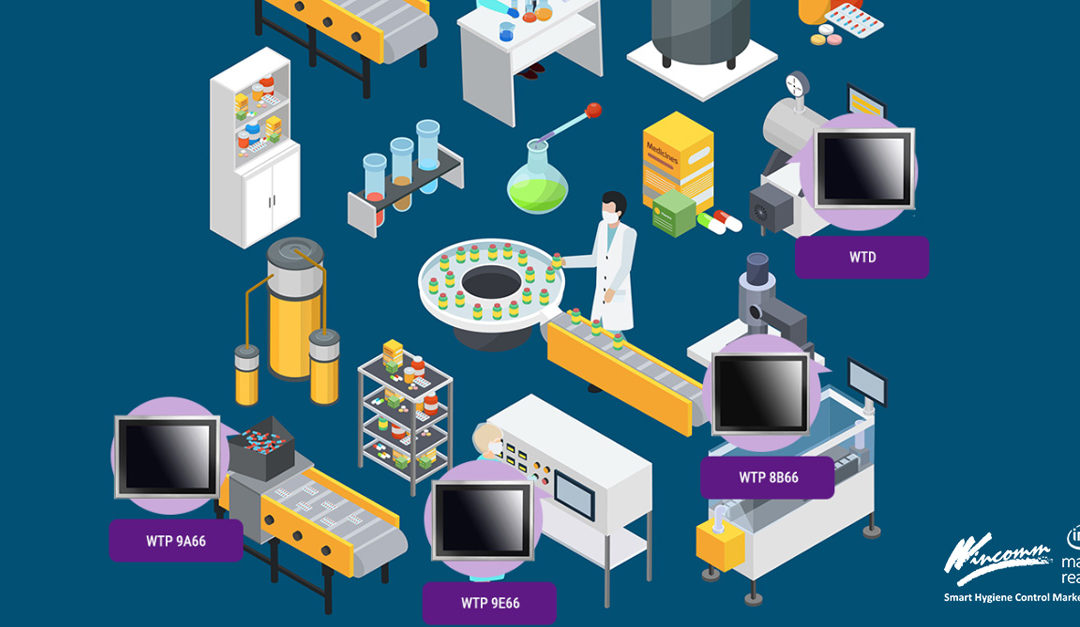Food and pharmaceutical processing facilities can benefit from smart hygiene control through the use of specialist industrial computing solutions.
Maintaining high standards of hygiene has always been crucial in facilities such as food and pharmaceutical processing plants.
In today’s world, the comparative ease of distribution of food and pharmaceutical products means that products made in a single factory can be sold and used all over the world. If these products were handled in an unhygienic manner, and became contaminated, potentially thousands of end users could be affected. An organisation may be crippled by the financial costs of recalling the failed product, compensating any victims, and paying any fines imposed by authorities. Additionally, a negative impact on the company’s reputation could cause it to become insolvent and, ultimately, file for bankruptcy.
More than anything, employees working in these plants need to feel secure in their working environment and have hygiene measures in place to help reduce the spread of bacteria and viruses and prevent spreading of illness. During the COVID-19 pandemic, it was government mandated for all personnel to wear PPE and practice social distancing, and authorities to implement stringent public and personal hygiene protocols.
Time to go ‘Smart’ with Hygiene Control
The key is to equip the food or pharmaceutical processing facilities with the ability to provide smart hygiene control using specialist industrial computing solutions featuring high-power processors, both central processing units (CPUs) and graphics processing units (GPUs), running sophisticated artificial intelligence (AI) and machine learning (ML) applications.
Monitoring the environment to suit processing conditions
The entire facility can be equipped with a wide range of microelectromechanical systems
(MEMs) sensors to monitor parameters like temperature and humidity. Using this data coupled with machine vision, smart control systems can ensure that consumables and pharmaceuticals are always processed/stored/transported in optimum environmental conditions.
Maintaining clean and sterilised environments
As a result of multiple product recalls in the recent past and the COVID-19 pandemic, manufacturing and processing facilities are becoming more aware of the importance of hygiene. Clearly, thoroughly cleaning and sterilising environments is now top priority and any equipment that comes into proximity of food/pharmaceuticals as part of their manufacturing/processing must be able to withstand rigorous cleaning. This calls for strict adherence to ingress protection (IP) codes against solids and liquids.
Achieving Hygiene Control with waterproof & dustproof standards
The IP code classifies and rates the degree of protection provided by mechanical casings and electrical enclosures against intrusion, dust, accidental contact, and water. In the case of food/pharmaceutical plants, an important goal of the standard is to achieve precision in various protection levels and remove any potential ambiguity around how “clean” a system actually is.
A rating of IP66 is a common and adequate measure for many industrial applications. IP66 is defined as being dust tight and being protected against powerful water jets, which allows cleaning the equipment without the fear of compromising it. However, in some cases an even higher rating is required; IP67 stipulates that the system must be completely watertight when fully immersed in water up to 1 m deep, and IP69K, means that the system must be completely watertight when subjected to close-range, high pressure, high-temperature spray downs.
In addition to wiping surfaces down with soap or disinfectant, equipment and gadgets in processing and preparation plants are often washed with jets of water and other liquids. This includes any human-machine interface (HMI), which could include electronic displays, buttons, and /or points where external power and other input/output (I/O) interfaces are connected to the system.
How can we help?
Our partner, WinComm develops high standard panel and box PCs among various other power and I/O interfaces with the necessary IP standards for hygiene and process control solutions for food/pharmaceutical facilities. It offers stainless steel panel PCs (all the way to IP69K rating) built on Intel’s 7th generation Core processors to the highest electromagnetic compatibility (EMC level 4.0) designed to give business owners peace of mind when it comes to hygiene, whilst also maintaining a high level of performance.
If your end application involves the manufacturing, processing, or preparation of food, beverages, or pharmaceuticals, then smart hygiene must be at the top of your requirements. If you are interested in knowing more about our industrial computing solutions for the food or pharmaceutical industry, contact us here

